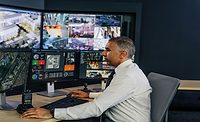Security at the forefront of reopening - How implementing facial recognition tech now can help bolster security later

The pandemic has put an indefinite hold on attending live sporting events, conferences, concerts and other mass gatherings, giving venues a unique chance to reevaluate their operating procedures. Around the world, local economies, governments and public venues are experiencing varying degrees of opening, most still far from a return to pre-pandemic levels.
While venue management was once centered around promoting the event people came to see, venue owners are now faced with a new challenge — security in an unfamiliar threat landscape. How can venues promise public safety during a time where social distancing is a necessity, and event spaces must be full to capacity to turn a profit? How do venues create an experience that will entice consumers to return to an in-person event while feeling confident that their health and safety is the top priority?
In 2020, facial recognition technology may be a silver bullet for ensuring safety and security inside venues. In addition to fostering an environment free from crime, facial recognition can ensure a convenient and contactless entry method, as well as improve and streamline the customer experience. From a sales perspective, this technology can give security professionals an advantage in an especially challenging time.
Adding an Increased Level of Safety
Facial recognition technology offers venue managers an ability to keep fans safe from lewd or offensive behavior as well as harmful crimes. When installed as a security checkpoint before entry, this technology can be used to screen potentially risky individuals, who may have committed previous crimes that could cause an issue at a public gathering, before they enter. Whether this is a rowdy fan who picks fights, shoplifters, pickpockets, or other security hazards, facial recognition technology provides venue management teams with the advantage of preventative action. Through comprehensive planning, preparing, and monitoring, venues can help reduce crime and unpleasant experiences had by those who pay money to attend. In a more extreme and serious case, this technology could also help prevent terrorism as those with incriminating histories or of the highest risk would be barred from entry.
Preventing the Transmission of COVID-19
During the COVID-19 pandemic, it is imperative that venues express goodwill to the public to regain their trust and encourage them to return in the future. By showing clientele they have top-notch measures in place, venues can appropriately monitor social distancing policies.
Some facial recognition systems can be paired with thermal scanning technology to prevent a patron with a fever from entering a facility. Additionally, these systems can be used to detect hotspots where people may have gathered together, so security can step in and help spread people out to a safe distance.
Over the past few years, some facial recognition technology has evolved to the point where it can detect faces despite masks and facial coverings. As a result, patrons who do not wear or remove required preventative facial coverings can be blocked from entering, reprimanded or asked to leave.
Furthermore, facial recognition technology can improve contact-tracing efforts. The technology can give venues insight into where an infected person was during the event, their proximity to other specific individuals, and the surfaces they touched.
Enhancing the Consumer Experience
Preventing crime and stopping the spread of COVID-19 improves the customer experience tremendously, but facial recognition technology can also expedite the security process. Venues can allow visitors to pre-register with facial recognition, allowing those visitors to bypass queues and other standard security protocols. Fast-track entry prevents bottlenecks at security gates for safety and social-distancing.
Another convenience-based advantage of facial recognition that extends beyond the COVID-age is contactless payment. Concession stands can scan facial imagery attached to a pre-registered credit card, reducing human contact or possible virus transmission, and giving consumers an added level of comfort knowing their wallets are safe at home.
Ensuring Privacy and Proper Use of Data
With all facial recognition use cases, there is news surrounding the technology that sharing private data can lead to issues. For privacy reasons, stadiums can implement facial recognition solutions on an opt-in basis, those who are comfortable take advantage of the quicker entry and added convenience. Venues can educate visitors that once their face is scanned, it is converted to an irreversible serial number, deleted from proper facial recognition systems within half a second, and will not be stored on any servers. Therefore, if a venue’s cybersecurity mainframe fails or is hacked, criminals will not be able to gain access to the personal data.
By upgrading safety standards and improving their experience, facial recognition technology can allow venues to reopen, increase revenue streams and enhance their existing security measures into the future. With a facial recognition system working behind the scenes, security personnel can stay focused on movement and real-time flexibility to respond to situations. With technology as a backbone, venues that invest in facial recognition now can spend more time on activities that will support the bottom line later.
Looking for a reprint of this article?
From high-res PDFs to custom plaques, order your copy today!





